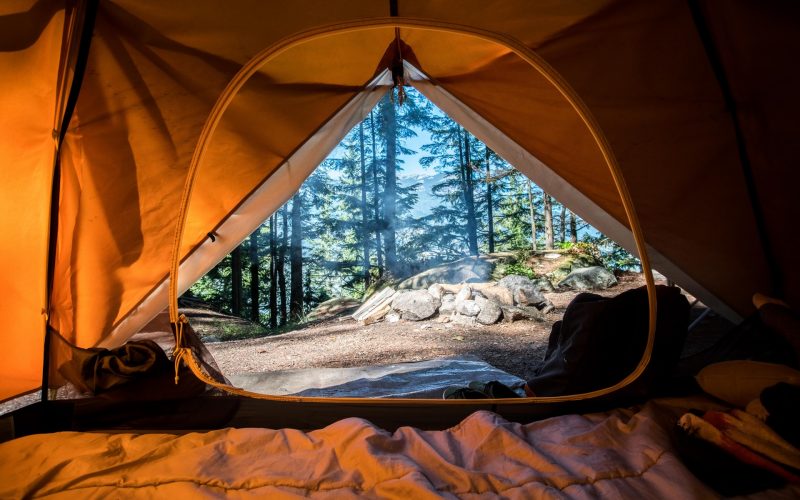Camping and caravanning is one of the most popular staycations in the UK. In fact, over 9 million trips were made to popular sites across the four nations in 2019, with that figure hopefully getting back to normal once restrictions are eased.
But whilst these trips are made to official campsites and holiday parks, there’s something known as wild camping that’s also a popular pastime for happy campers. It gives people the chance to sit under the stairs in stunning rural locations.
Today we’re going to share an essential guide on what it is, the legal aspects of camping in the wild, and the essentials you need should you decide to discover the great outdoors.
What is wild camping?
Essentially, wild camping is a concept where you set up camp outside of a campsite or caravan park and sleeping in the wilderness. People often camp in the wild if they’re completing a multi-day hike and need somewhere to stay that offers peace and tranquillity.
It can be daunting process if you’ve never done it before, so keep reading below for more information on how to wild camp in the UK.
The legal side
When it comes to the legalities of wild camping, it’s important to remember where you are before you decide to set up pitch. In England, Northern Ireland and Wales, wild camping is technically illegal if you don’t seek permission from the landowner — although there is the odd exception to the rule.
In Scotland, the picture is slightly different. As part of Scotland’s access legislation, the Land Reform (Scotland) Act 2003, campers can use most unenclosed land to get their heads down for the night.
Although, there’s a greater level of freedom in Scotland, there’s still areas where you need seek the landowner’s permission or have a permit. Areas of Loch Lomond and the Trossachs National Park are subject to wild camping byelaws, meaning that you must use designated campsites due to overuse.
It’s also important to follow these guidelines whether you wild camp, whether that’s in England, Northern Ireland, Scotland or Wales:
- Use a stove instead of a fire
- If you light a fire, keep it small
- Leave the area as you found it
- Use public toilets where possible
- Ask residents if it’s okay to camp near their property
- Don’t litter and tidy up after yourself
Most searched for spots
Just like the most popular caravan sites, wild camping has its favourite hotspots amongst keen campers. Based on Google Trends data in 2020, these areas in the UK are the most popular places for wild camping.
Dartmoor wild camping – 2400
Dartmoor is an upland area located in the South of Devon. Its moorland and surrounding land have been protected by National Park status since 1951. Its status as a National Park makes it one of the most popular and stunning places to visit in the UK.
Dartmoor is one of the only spots in England where you can wild camp freely. Just make sure you check which area of the National Park you are in before you set up camp, as some areas are still restricted.
Lake District wild camping – 2400 searches
The Lake District is another area of the UK that’s known for stunning beauty and rural appeal – and holds the title for being the UK’s biggest National Park.
It sits in joint first place for wild camping searches with Dartmoor. You will need to seek permission from the landowner first to go wild camping, but we can see why so many people search for the area.
Peak District wild camping – 1600 searches
Much like the Lake District, the Peak District doesn’t allow wild camping in areas of the National Park without seeking permission from the landowner.
Its central location and beautiful scenery make it such a popular place to visit, so if you do have the green light from the landowner then you’re in for memorable treat.
Brecon beacons wild camping – 880 searches
Third on our list and the third National Park that doesn’t legally allow people to camp freely without seeking permission first.
Located in South Wales, if you do have permission to camp then you’ll get to experience the gorgeous mountain ranges and miles of open green space to walk in. It’s truly a breath-taking area of the UK and one that everyone should experience at least once.
Snowdonia wild camping – 880 searches
Snowdonia makes up our list for the most popular wild camping searches. Much like its counterparts, excluding Dartmoor, you can’t just turn up and pitch your tent, but if you can get permission you’re again in for an experience that will last a lifetime.
It’s the largest National Park in Wales and offers visitors stunning views, long stretches of green space and the challenge of reaching the summit of the largest mountain in Wales.
Don’t forget the essentials
So you’ve picked your spot, sought the landowners permission, and now you’re ready to go wild camping. But what do you take with you? Well, you need somewhere to sleep, so you’ll need a tent, along with a sleeping bag and other sleeping equipment.
When it comes to a tent, it’s practical to have one that’s easy to carry, especially if you’ve found more than one spot to rest your head. Make sure you research the best backpacker tents that suit your needs.
For cooking, it’s important to remember your trusty portable stove. It will allow you to cook all kinds of food and you won’t need to rely on a fire — that could be damaging for the surrounding area.
Don’t forget your supply of bottled gas and eating equipment or you may be left with a hungry belly. You may struggle for signal in rural areas too, so take a map with you. If only to embrace nature instead of technology.
That completes our essential guide to wild camping in the UK. Always remember to stay safe and if you need to, seek permission before you set off on your travels.









